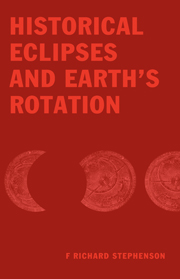Book contents
- Frontmatter
- Contents
- Principal Symbols
- 1 Variations in the length of the day: a historical perspective
- 2 Tidal friction and the ephemerides of the Sun and Moon
- 3 Pre-telescopic eclipse observations and their analysis
- 4 Babylonian and Assyrian records of eclipses
- 5 Investigation of Babylonian observations of solar eclipses
- 6 Timed Babylonian lunar eclipses
- 7 Untimed Babylonian observations of lunar eclipses: horizon phenomena
- 8 Chinese and other East Asian observations of large solar eclipses
- 9 Other East Asian observations of solar and lunar eclipses
- 10 Records of eclipses in ancient European history
- 11 Eclipse records from medieval Europe
- 12 Solar and lunar eclipses recorded in medieval Arab chronicles
- 13 Observations of eclipses by medieval Arab astronomers
- 14 Determination of changes in the length of the day
- Appendix A Timed data
- Appendix B Untimed data
- References
- Acknowledgements
- Index of eclipse records
- Index of places of observation
- Name Index
- Subject index
5 - Investigation of Babylonian observations of solar eclipses
Published online by Cambridge University Press: 13 November 2009
- Frontmatter
- Contents
- Principal Symbols
- 1 Variations in the length of the day: a historical perspective
- 2 Tidal friction and the ephemerides of the Sun and Moon
- 3 Pre-telescopic eclipse observations and their analysis
- 4 Babylonian and Assyrian records of eclipses
- 5 Investigation of Babylonian observations of solar eclipses
- 6 Timed Babylonian lunar eclipses
- 7 Untimed Babylonian observations of lunar eclipses: horizon phenomena
- 8 Chinese and other East Asian observations of large solar eclipses
- 9 Other East Asian observations of solar and lunar eclipses
- 10 Records of eclipses in ancient European history
- 11 Eclipse records from medieval Europe
- 12 Solar and lunar eclipses recorded in medieval Arab chronicles
- 13 Observations of eclipses by medieval Arab astronomers
- 14 Determination of changes in the length of the day
- Appendix A Timed data
- Appendix B Untimed data
- References
- Acknowledgements
- Index of eclipse records
- Index of places of observation
- Name Index
- Subject index
Summary
Introduction
In this chapter, all accessible reports of solar eclipses preserved on the Late Babylonian astronomical texts which are of value in studying the Earth's past rotation will be investigated. Compared with the substantial number of observations which must have originally been made, very few Babylonian records of solar eclipses are now extant. Reasons for this are briefly discussed in chapter 4. Reliable observations only range in date from 369 to 136 BC – less than half the period covered by lunar eclipse sightings.
The solar eclipses which form the subject of the present chapter will be divided into four categories: (i) the only known example of a total obscuration of the Sun observed at Babylon (dating from 136 BC); (ii) measurements of the local times of a variety of eclipse contacts; (iii) estimates of solar eclipse magnitude at maximum phase; and (iv) instances when the Sun rose or set whilst obscured. Several of these observations have already been discussed in chapter 3, where they were used to illustrate various analytical techniques. However, they will now be considered in greater detail. At the close of this chapter, a possible allusion to a total solar eclipse recorded in the Religious Chronicle of Babylon will be considered. This event probably took place around 1000 BC – much earlier than the period covered by the Late Babylonian texts.
All eclipse records on the Late Babylonian texts where the date is doubtful will be rejected, as will questionable readings of damaged signs.
- Type
- Chapter
- Information
- Historical Eclipses and Earth's Rotation , pp. 128 - 146Publisher: Cambridge University PressPrint publication year: 1997



